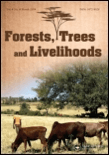
Forests Trees and Livelihoods
Scope & Guideline
Exploring the Interconnections of Nature and Community
Introduction
Aims and Scopes
- Sustainable Forestry Practices:
Research on methods and strategies that support sustainable management of forest resources, ensuring ecological balance while meeting the needs of local communities. - Agroforestry Systems:
Exploration of agroforestry as a viable land-use practice that integrates trees with crops and livestock, enhancing productivity and sustainability. - Community Livelihoods and Socio-economic Impacts:
Examination of how forestry and tree-based systems contribute to the livelihoods of local communities, including economic benefits, food security, and social well-being. - Indigenous Knowledge and Practices:
Investigations into traditional ecological knowledge and practices of indigenous communities, emphasizing their role in biodiversity conservation and sustainable land management. - Environmental and Ecological Studies:
Research on the ecological impacts of forestry practices, including biodiversity assessments, ecosystem services, and responses to climate change. - Policy and Governance in Forestry:
Analysis of the governance structures and policy frameworks that influence forest management and community engagement in sustainable practices.
Trending and Emerging
- Climate Change Adaptation and Resilience:
A growing focus on how forestry and agroforestry practices can contribute to climate change adaptation and resilience, particularly in vulnerable regions and communities. - Community-based Resource Management:
Increased emphasis on community-based management approaches that empower local populations and recognize their rights and responsibilities in managing forest resources. - Non-timber Forest Products (NTFPs):
Rising interest in the role of NTFPs in supporting livelihoods, biodiversity conservation, and sustainable forest management, reflecting a shift from timber-centric perspectives. - Socio-cultural Aspects of Forestry:
Emerging research themes are exploring the socio-cultural dimensions of forestry, including community perceptions, cultural practices, and the importance of traditional knowledge in sustainable management. - Technological Innovations in Forestry:
An increase in studies focusing on the application of technology in forestry, such as remote sensing, GIS, and data analytics to improve forest management and monitoring.
Declining or Waning
- Traditional Timber Production:
Research focused solely on traditional timber production and logging practices is decreasing, potentially due to a broader shift towards sustainable and multifunctional forest management approaches. - Single-species Forest Management:
The emphasis on single-species forest management strategies is waning, as there is a growing recognition of the importance of biodiversity and mixed-species systems for resilience and ecosystem health. - Urban Forestry Initiatives:
Publications on urban forestry initiatives are becoming less frequent, possibly as rural and community forestry topics gain more attention in the context of global food security and rural livelihoods. - Exclusively Economic Assessments of Forestry:
There is a noticeable decline in papers that focus solely on the economic assessments of forestry without integrating social and environmental dimensions, reflecting a shift towards more holistic approaches.
Similar Journals
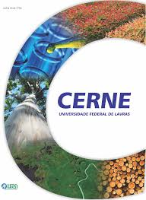
Cerne
Empowering Forestry Research through Open AccessCerne is a distinguished open-access journal dedicated to advancing knowledge in the field of forestry, published by the Universidade Federal de Lavras (UFLA). Since its inception in 1994, the journal has actively contributed to the global discourse on sustainable forest management and biodiversity conservation, presenting research findings that are both relevant and impactful. With its ISSN 0104-7760, Cerne aims to foster collaboration among researchers, professionals, and students, enhancing the understanding of forestry practices in Brazil and beyond. As of 2023, it holds a respectable Q3 ranking in the forestry category, further cementing its position within the academic community, illustrated by a Scopus ranking of #97 out of 174 in the Agricultural and Biological Sciences - Forestry field. Operating under an open-access model allows for wide dissemination of research outputs, ensuring that critical findings reach a broad audience, fueling further innovation and discovery in the field. With converged years extending from 2007 to 2024, Cerne continues to be a vital resource for anyone engaged in forestry research and practices.
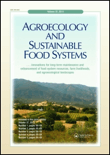
Agroecology and Sustainable Food Systems
Advancing sustainable practices for a resilient future.Agroecology and Sustainable Food Systems, published by Taylor & Francis Inc, is a premier academic journal dedicated to advancing the science of agroecology and its applications in sustainable food systems. With an impact factor that reflects its significant influence in the field, this journal serves as a vital resource for researchers, industry professionals, and students engaged in sustainability, agriculture, and environmental studies. As of 2023, it proudly holds a Q1 ranking in Agronomy and Crop Science, as well as Q2 rankings in Development and Renewable Energy, Sustainability, and the Environment categories. Covering a broad spectrum of topics, it not only shares peer-reviewed research but also encourages discourse on innovative practices and policies that enhance food security and ecological balance. Available for access through various options including Open Access, the journal's commitment to knowledge dissemination is further underscored by its substantial rankings on Scopus, with notable percentiles across multiple disciplines. By focusing on agroecological principles and their socio-economic implications, Agroecology and Sustainable Food Systems is essential for those looking to stimulate meaningful change in agricultural practices and sustainability initiatives worldwide.

Revista Forestal Mesoamerica Kuru-RFMK
Innovating practices for sustainable forest ecosystems.Revista Forestal Mesoamerica Kuru-RFMK is a vital academic platform dedicated to the advancement of forest science and management within the Mesoamerican region. Published by the Instituto Tecnológico de Costa Rica, this journal has been an Open Access resource since 2011, ensuring that critical research is accessible to a global audience. With an ISSN of 2215-2504, it aims to foster collaboration and knowledge exchange among researchers, professionals, and students eager to address the pressing challenges facing forests in Central America. The journal prioritizes interdisciplinary studies related to forest ecology, conservation, and sustainable management practices, making it an indispensable reference for anyone interested in enhancing forest health and biodiversity. By contributing to this resource, scholars can impact policy and practice while enriching the academic community’s understanding of Mesoamerica's unique forest ecosystems.
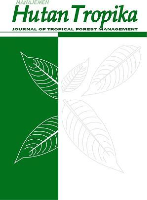
Jurnal Manajemen Hutan Tropika
Empowering ecological understanding through open access.Jurnal Manajemen Hutan Tropika, with ISSN 2087-0469 and E-ISSN 2089-2063, is an esteemed academic journal published by the Bogor Agricultural University, Faculty of Forestry in Indonesia. Since its inception in 1999 as an Open Access journal, it has been dedicated to advancing knowledge in the fields of ecology, forestry, and related environmental sciences. Aiming to provide a robust platform for disseminating research, it has achieved notable rankings within Scopus, including a Q3 classification in Ecology and Ecology Evolution, as well as a Q2 ranking in Forestry for 2023. The journal's commitment to open access ensures that vital research findings are readily available to researchers, professionals, and students alike, fostering collaboration and innovation in tropical forest management. Located at KAMPUS IPB DARMAGA, BOGOR, JAWA BARAT, this journal continues to be a significant resource for enhancing sustainable forest practices and contributing to ecological understanding in the region and beyond.
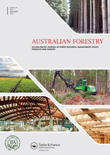
AUSTRALIAN FORESTRY
Innovating Forestry Practices for TomorrowAustralian Forestry is an esteemed journal dedicated to advancing knowledge in the field of forestry and related environmental science. Published by Taylor & Francis Australia, this journal plays a pivotal role in disseminating high-quality research that spans various aspects of forestry, including sustainable management, conservation practices, and policy analysis. With an impact factor reflecting its significance in the academic community and a Scopus rank of #44 out of 174 in the category of Agricultural and Biological Sciences, Australian Forestry proudly holds a Q2 ranking in its field as of 2023. The journal has maintained a continuous publication record since its inception in 1936, with a commitment to addressing contemporary challenges within forestry. Researchers, professionals, and students alike are invited to engage with this vital resource that fosters insightful dialogue, innovative solutions, and a deeper understanding of forestry science.
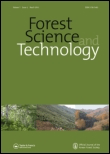
Forest Science and Technology
Empowering environmental solutions with cutting-edge science.Forest Science and Technology is a premier open access journal published by Taylor & Francis Ltd, based in the United Kingdom. Established in 2005, this journal has become a key platform for disseminating high-quality research in the fields of Forestry and Environmental Science, maintaining a strong impact factor and impressive Scopus rankings. As of 2023, it proudly holds a Q2 quartile ranking in Forestry and a Q3 quartile ranking in Management, Policy, and Law categories, highlighting its significance in addressing contemporary challenges in forest management and conservation. With a dedication to fostering scholarly communication, the journal supports open access since 2017, making valuable findings accessible to a wider audience, including researchers, professionals, and students. With the coverage period extending to 2024, Forest Science and Technology continues to contribute to the discourse on sustainable forestry practices and innovative management strategies.

FORESTRY CHRONICLE
Cultivating insights for responsible forest management.FORESTRY CHRONICLE, published by the Canadian Institute of Forestry, is a leading journal dedicated to advancing knowledge in the field of forestry and environmental science. With a rich history of dissemination of impactful research since its inception, this journal plays a crucial role in bridging the gap between theory and practice for professionals, researchers, and students alike. Based in Canada, the journal is indexed in Scopus, ranking within the Q3 quartile for the field of Forestry and demonstrating its commitment to quality and relevance in agricultural and biological sciences. While it does not currently offer open access, its circulation extends internationally, ensuring a wide reach for innovative ideas and findings in forest management, conservation, and ecological sustainability. As a vital resource, FORESTRY CHRONICLE continues to foster dialogue and collaboration among stakeholders invested in the sustainable use of forest resources, making it an essential addition to your academic repertoire.
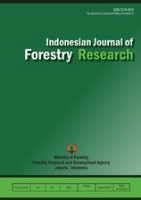
Indonesian Journal of Forestry Research
Fostering global collaboration in forestry science.The Indonesian Journal of Forestry Research is a distinguished, peer-reviewed academic journal published by the Ministry of Environment & Forestry of Indonesia. With an ISSN of 2355-7079 and E-ISSN 2406-8195, this journal has been an Open Access platform since 2014, fostering international collaboration and knowledge sharing in the fields of ecology and forestry. As of 2023, the journal holds a respectable Q3 category in both Ecology and Forestry, reflecting its contribution to the science community. It ranks #99/174 in Forestry and #305/461 in Ecology in Scopus, indicating its growing influence in the respective fields. Aimed at researchers, professionals, and students, the Indonesian Journal of Forestry Research provides vital insights and findings, supporting sustainable forestry practices and environmental management in Indonesia and beyond. With an emphasis on innovative methodologies and applied research, this journal stands as a pivotal resource for those dedicated to advancing forestry science and ecological research.

Floresta e Ambiente
Exploring the ecological significance of forests worldwide.Floresta e Ambiente is a pioneering open-access journal dedicated to advancing knowledge in forestry and environmental science, published by the Federal Rural University of Rio de Janeiro's Institute of Forests. Since its inception in 2012, this journal has emerged as a crucial platform for researchers, professionals, and students to disseminate innovative findings and foster discussions on sustainable forest management, conservation practices, and the ecological significance of forests in Brazil and beyond. With an impressive impact factor and a commendable ranking in the SCOPUS database, positioned in the 49th percentile of the Agricultural and Biological Sciences category, Floresta e Ambiente actively supports the dissemination of high-quality research while contributing to the global discourse on forestry. As an open access journal since 2013, it ensures that valuable knowledge is readily available to all, enhancing collaboration and engagement within the scientific community.
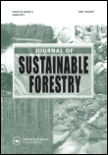
Journal of Sustainable Forestry
Cultivating a sustainable future through research and collaboration.Journal of Sustainable Forestry is a premier academic publication dedicated to advancing knowledge and practices in the field of sustainable forestry and environmental management. Published by Taylor & Francis Inc in the United Kingdom, this journal has been a cornerstone for researchers and professionals since its inception in 1992. With an impressive reputation, it boasts a 2023 Q2 ranking in Food Science, Forestry, and Geography, Planning and Development, highlighting its significant contribution to interrelated disciplines. The journal’s impact is further underscored by its Scopus ranking, especially in Forestry where it holds the 43rd position out of 174 publications, placing it in the 75th percentile. Although not open access, the journal remains committed to providing innovative research and practical insights into forest management, ecological sustainability, and policy development. As the field of sustainable forestry continues to evolve, the Journal of Sustainable Forestry serves as an essential resource for those committed to advancing sustainable practices globally, fostering a deeper understanding of how sustainable forestry can contribute to environmental resilience and biodiversity conservation.